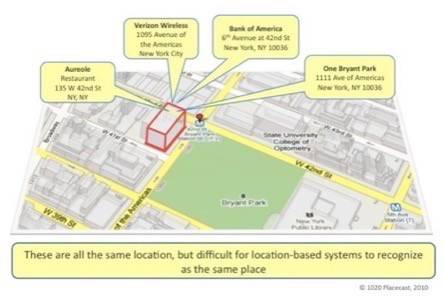As the market for location-based services continues to grow, it’s becoming increasingly important for these companies to have access to correct location data. Placecast helps developers ensure that their location databases are accurate. The service also allows developers to exchange data with other services that might have slightly different data sets. After looking at the data sets of its 200 customers, Placecast found that the average fault rate for the location data sets is about 8%. Location databases that include a high proportion of user-generated content, however, had fault rates that were often as high as 40%.

Placecast wants to be the “Rosetta Stone” for developers that work with location data. The company’s MatchAPI helps developers to create a single database with location data, even if they are getting their data from multiple sources and have to interact with multiple data sources. The MatchAPI disambiguates and de-duplicates addresses by identifying all the different ways that users (and other databases) can identify an address. This is especially important if an app allows users to create their own locations. If you are using a location-based service that often shows multiple names for the same venue (often with slight variations), you know how distracting these errors can be.

Currently, there is no single location database with perfectly accurate information that all of the different vendors can access – and that’s probably a good thing, as it allows developers to use the databases that suit their needs best. If Placecast’s data is correct, however, an error rate that ranges from 8% to 40% is simply too high for consumer products that want to guide people to the right location in the real world.

















